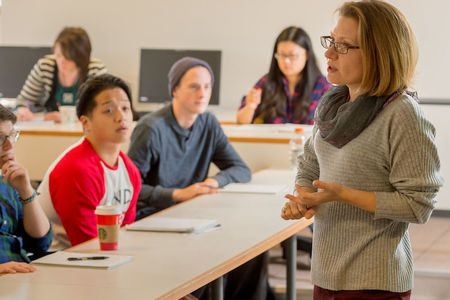Graduate
Why pursue graduate studies at Notre Dame?

Sociology faculty work with you to become an outstanding independent scholar, with a robust research agenda. We’ll help you develop into peers and colleagues who follow their passion and generate creative, original scholarship. By the time you graduate you’ll make serious contributions to research, submit your work to sociology journals, and teach your own class. You’ll be ready for a career in academia, or research positions at think tanks, non-profits, and industry.
Our program is known for our vibrant intellectual culture and collegial, inclusive, and supportive community. We have an excellent reputation among our peers. We are the top-ranked social science program at Notre Dame and our star is on the rise — we’ve hurtled 17 spots up the rankings since 2005. We are known for our expertise in cultural sociology, education, political sociology, and social movements, religion, and theory. The department also has strengths in family, gender and sexuality, international development, organizations, race and ethnicity, social psychology, and stratification.
Our regular colloquium series, training seminars and workshops, and professional seminars expose you to innovative new sociological work, help you develop a taste for sociological excellence, and prepare you to find (and keep) a job in academia.
There are a number of Ph.D. programs you could attend. What is Notre Dame’s edge?
Multiple mentorship
At Notre Dame we pride ourselves on putting you into a research apprenticeship on day one. Unlike most programs where you spend most of your time as a teaching assistant for large lecture classes, we think you should learn by doing, working with faculty on collaborative research projects. Our department embraces a multiple mentorship model. No one advisor can train you in every skill you need to succeed, so we encourage you to work with a variety of faculty to hone your craft. You’ll develop close working relationships with a number of our accessible faculty who are both innovators in their field and present in the life of the department.
We value faculty and graduate student collaboration, with more than 30 co-authored articles and books by faculty and graduate students over the past five years.
You’ll also have an opportunity to teach your own class, working closely with a teaching mentor who can advise you on syllabus design and help you improve by observing your teaching. You’ll also develop your classroom skills with training seminars at the Kaneb Center for Teaching Excellence.
Hear it from our Graduates
“I appreciate the latitude and liberty Notre Dame Sociology gives graduate students to find their own interests, craft their own identity in the field and develop creative scholarship. I never felt pressured to fit in and was never pigeon-holed as this or that kind of sociologist. I could find my own path. In a field that trades on distinction, this strikes me as being by far the most important kind: distinct scholarship that speaks to its author's originality. Speaking from hindsight and with the benefit of experience in other departments and graduate programs, I consider this to be a unique strength of the Department of Sociology at Notre Dame.”
Michael Strand, Assistant Professor, Brandeis University
“I appreciated the culture of the Department of Sociology as a graduate student because there was mentorship built into the program. Graduate student offices were set-up where newer students were placed in offices with senior students and I benefited immensely from advice and guidance they provided. Support from senior graduate students supplemented the support from advisors. Once I became the senior graduate student, I was able to pass down the information and mentorship to the next cohort of new students. The support and camaraderie from fellow students made an impact because I never once felt the environment was competitive or hostile.”
Nicole Perez, Post-doc, University of Illinois Chicago
“I chose to come to Notre Dame Sociology because the culture had the right blend of competitiveness and supportive community — a blend that is necessary for long-term success in research and teaching. This culture was due, in part, to the freedom we were given to pursue our research, rather than having to satisfy burdensome teaching commitments. Further, as a program on the move, there was a sense that the department had a healthy chip on its shoulder, which filters down to the students. It is a department that isn’t stuck in the past or resting on its laurels. For that reason I am very proud to be a graduate of Notre Dame Sociology.”
Justin Farrell, Professor, Yale University